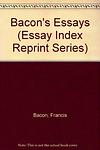Francis Bacon
Francis Bacon (1561–1626) was an English philosopher, statesman, scientist, jurist, orator, and author. He served both as Attorney General and as Lord Chancellor of England. Bacon has been called the father of empiricism. His works argued for the possibility of scientific knowledge based only upon inductive reasoning and careful observation of events in nature. Most importantly, he advocated for a scientific method that was free from the logical fallacies and personal biases that affected the science of the time. Bacon's writings contributed to the development of the scientific method and to the modern scientific inquiry.
Books
This list of books are ONLY the books that have been ranked on the lists that are aggregated on this site. This is not a comprehensive list of all books by this author.
-
1. New Atlantis
"New Atlantis" is a utopian novel that explores the fictional island of Bensalem, discovered by a crew of shipwrecked Europeans. The island is home to a society where scientific research and discovery is highly valued, and advancements in technology and science have led to a utopian lifestyle for its inhabitants. The novel explores themes of science, religion, and politics, and presents a vision of an ideal society achieved through knowledge and learning.
-
2. Essays
This collection is a seminal work of English literature, comprising a series of essays that delve into various subjects, ranging from politics and religion to love and truth. Written in the early 17th century, the essays are celebrated for their concise wisdom, rhetorical brilliance, and the author's deep insights into human nature and the complexities of life. The author, a philosopher, statesman, and scientist, employs a didactic style, offering practical advice and reflections on morality and ethics, which have remained relevant through the ages. The work is not only a reflection of the author's vast intellect and observational prowess but also serves as a valuable philosophical guide, illuminating the human condition and the societal norms of his time.
-
3. Novum Organum
This book is a philosophical work that presents a new method of acquiring knowledge and understanding the natural world, rejecting the traditional methods of the time. The author argues that human understanding is hindered by certain 'idols' or false notions, and proposes an inductive, experimental method, known as the 'Baconian method', which involves gathering data, making observations, and conducting experiments to understand the world. This method is seen as a precursor to the modern scientific method.


